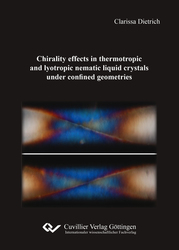| Areas | |
|---|---|
| Serie de libros (96) |
1381
|
| Nachhaltigkeit |
3
|
| Gesundheitswesen |
1
|
| Letra |
2370
|
| Ciencias Naturales |
5408
|
| Matemática | 229 |
| Informática | 319 |
| Física | 980 |
| Química | 1364 |
| Geociencias | 131 |
| Medicina humana | 243 |
| Estomatología | 10 |
| Veterinaria | 108 |
| Farmacia | 147 |
| Biología | 835 |
| Bioquímica, biología molecular, tecnología genética | 121 |
| Biofísica | 25 |
| Nutrición | 45 |
| Agricultura | 1005 |
| Silvicultura | 201 |
| Horticultura | 20 |
| Ecología y conservación de la tierra | 148 |
| Ciencias Ingeniería |
1795
|
| General |
98
|
|
Leitlinien Unfallchirurgie
5. Auflage bestellen |
|
Erweiterte Suche
Chirality effects in thermotropic and lyotropic nematic liquid crystals under confined geometries (Tienda española)
Clarissa Dietrich (Autor)Previo
Lectura de prueba, PDF (1,6 MB)
Indice, PDF (520 KB)
Chirality is a phenomenon in nature that appears across all disciplines of natural science, from biology to mathematics. The spontaneous formation of chiral structures in a system of achiral components is known as spontaneous mirror symmetry breaking and is by itself of fundamental interest leading also towards the question of the origin of homochirality in nature in general. In this work, we show that by means of the topology imposed by the confining geometry and by interfacial boundary conditions – in combination with the physical properties of a liquid crystal – spontaneous mirror symmetry broken structures can be obtained. They are analyzed, inter alia, with respect to the types of geometrical confinements used, e.g. how the confinement amplifies, induces, and influences the detection of chirality effects in order to facilitate the measurement of tiny amounts of chiral additives qualitatively and quantitatively.
| ISBN-13 (Impresion) | 9783736971288 |
| ISBN-13 (E-Book) | 9783736961289 |
| Formato | A5 |
| Idioma | Inglés |
| Numero de paginas | 190 |
| Laminacion de la cubierta | Brillante |
| Edicion | 1. |
| Lugar de publicacion | Göttingen |
| Lugar de la disertacion | Stuttgart |
| Fecha de publicacion | 09.12.2019 |
| Clasificacion simple | Tesis doctoral |
| Area |
Física de materia condensada ( incluyendo física de cuerpos solidos, optica)
Físicoquimica |
| Palabras claves | Natural Science, Physics, Liquid Crystals, Nematic Liquid Crystals, Lyotropic Liquid Crystals, Thermotropic Liquid Crystals, Chirality Effects, Confined Geometries, Chirality, Spontaneous Mirror Symmetry Breaking, Chiral Induction, Handedness, Helices, Defects, Topology, Elasticity, Viscosity, Droplets, Light Scattering, Anisotropic Surfaces, Naturwissenschaft, Physik, Flüssigkristalle, Nematische Flüssigkristalle, Lyotrope Flüssigkristalle, Thermotrope Flüssigkristalle, Chiralitätseffekte, Beschränkte Geometrien, Chiralität, Spontane Spiegelsymmetriebrechung, Chirale Induktion, Händigkeit, Helix, Defekte, Topologie, Elastizität, Viskosität, Tropfen, Lichtstreuung, Anisotrope Oberflächen |
| URL para pagina web externa | https://www.ipc.uni-stuttgart.de/giesselmann/ |








